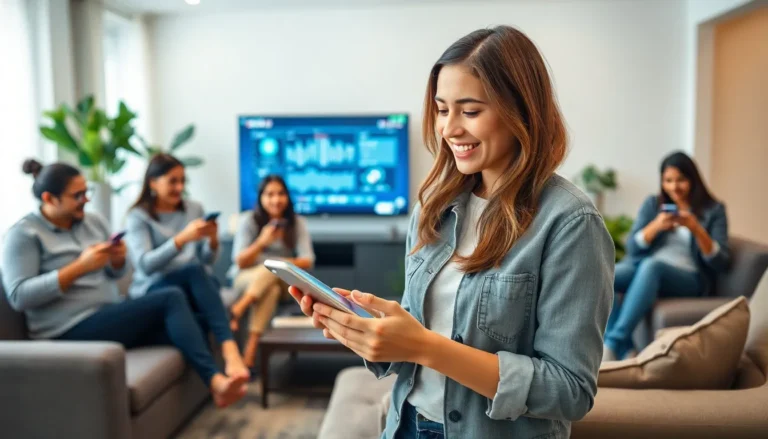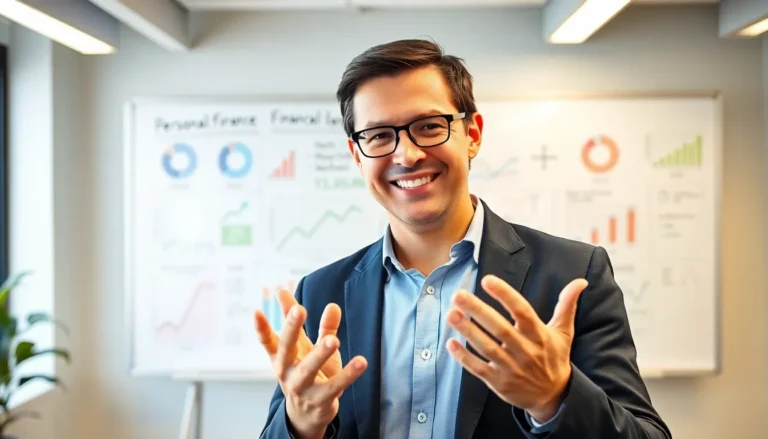In a world where problem-solving often feels like trying to find a unicorn in a haystack, creative thinking skills are the magical tools that can turn mundane challenges into exciting opportunities. Whether it’s brainstorming the next big idea or simply figuring out how to get out of a sticky situation (like how to explain that mysterious coffee stain on your shirt), honing these skills can transform anyone into a master of innovation.
Table of Contents
ToggleUnderstanding Creative Thinking Skills
Creative thinking skills represent cognitive abilities that allow individuals to approach problems uniquely. These skills involve generating new ideas or concepts and making connections between seemingly unrelated elements.
Definition of Creative Thinking
Creative thinking encompasses a process that involves imaginative thinking and idea generation. This type of thinking allows people to explore possibilities beyond conventional boundaries. Characteristics include open-mindedness and the ability to envision multiple solutions to a given problem. Individuals who excel at creative thinking often exhibit a willingness to experiment and take risks. This approach enables them to break free from traditional patterns and develop innovative solutions to challenges.
Importance of Creative Thinking Skills
Creative thinking skills play a critical role in various fields, enhancing problem-solving capabilities. Individuals with strong creative thinking skills tend to adapt better in dynamic environments. They tackle complex issues with fresh perspectives, leading to more effective strategies. Creativity fosters collaboration, allowing team members to combine their ideas and produce superior outcomes. Organizations that prioritize these skills enjoy a competitive edge, as they can pivot quickly in response to market demands and customer needs. Emphasizing creative thinking cultivates an agile mindset, essential for continuous growth and innovation.
Techniques to Enhance Creative Thinking Skills

Enhancing creative thinking skills involves practical techniques that foster innovation and unique problem-solving. These methods provide structure while encouraging freedom in thought.
Brainstorming
Brainstorming encourages the free flow of ideas without immediate judgment. Participants generate numerous suggestions within a set timeframe, allowing creativity to flourish. This technique focuses on quantity over quality, aiming for as many ideas as possible, thus removing the pressure of perfection. In group settings, using diverse perspectives can further enrich the brainstorming process. Regular practice of this technique leads to innovative solutions for complex challenges.
Mind Mapping
Mind mapping visualizes ideas and their connections, promoting an organized approach to creative thinking. Central concepts branch out into related topics, allowing for the exploration of thoughts in a non-linear fashion. This method helps individuals visualize relationships and generate new ideas based on existing ones. Creating a mind map can clarify thoughts and enhance memory retention. Utilizing different colors and images within the map can stimulate further creativity and engagement with the material.
Barriers to Creative Thinking Skills
Barriers can hinder the development of creative thinking skills. Identifying these obstacles is crucial for fostering innovation and enhancing problem-solving abilities.
Common Obstacles
Fear of failure often stifles creativity. Individuals might avoid taking risks due to anxiety about negative outcomes. Rigid thinking limits exploration of new ideas. Inconsistent motivation can further obstruct creative processes. Negative feedback can discourage experimentation and suppress originality. Over-reliance on established protocols might lead to stagnation, preventing fresh approaches to challenges.
Overcoming Limitations
Encouraging a culture that embraces failure as a learning opportunity stimulates creative growth. He or she can actively seek diverse perspectives to expand thinking. Allowing time for brainstorming sessions enhances idea generation without judgment. Supporting flexibility in processes permits exploration of alternative solutions and encourages innovation. Fostering an environment that celebrates experimentation cultivates a mindset open to creative thinking, driving continuous improvement and adaptation.
Applications of Creative Thinking Skills
Creative thinking skills find extensive use in various contexts, shaping how individuals tackle challenges and seize opportunities.
In the Workplace
Creativity drives innovation in professional settings. Companies that embrace creative thinking cultivate a culture of collaboration, leading to original ideas and efficient problem-solving. Employees who integrate these skills into daily tasks often find unique solutions, enhancing productivity and engagement. Brainstorming sessions generate diverse perspectives, while mind mapping aids in organizing thoughts effectively. This synergy between collaboration and structured creativity enables organizations to stay competitive in fast-paced markets.
In Personal Life
Creative thinking significantly impacts personal decision-making and lifestyle choices. Individuals use these skills to approach everyday problems with fresh perspectives, transforming mundane tasks into enjoyable challenges. Whether planning a family vacation or finding solutions for home organization, creativity unlocks new possibilities. Engaging in artistic hobbies or exploring new interests can also stimulate creative thought. Such activities foster a sense of fulfillment, allowing individuals to express themselves uniquely while enhancing overall life satisfaction.
Creative thinking skills are essential for navigating life’s challenges and seizing opportunities. By embracing these skills individuals can unlock innovative solutions that not only enhance personal growth but also contribute to organizational success. Cultivating an environment that encourages experimentation and diverse perspectives fosters a culture of creativity.
Whether through brainstorming or mind mapping individuals can enhance their problem-solving capabilities and approach situations with renewed energy. Overcoming barriers to creative thinking is crucial for unlocking potential and driving continuous improvement. Ultimately the journey of developing creative thinking skills is a rewarding endeavor that leads to greater fulfillment and success in various aspects of life.










